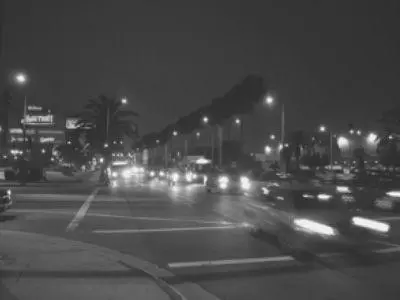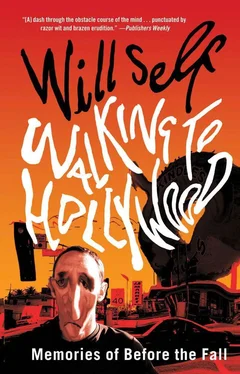Will Self - Walking to Hollywood
Здесь есть возможность читать онлайн «Will Self - Walking to Hollywood» весь текст электронной книги совершенно бесплатно (целиком полную версию без сокращений). В некоторых случаях можно слушать аудио, скачать через торрент в формате fb2 и присутствует краткое содержание. Год выпуска: 2011, Издательство: Grove/Atlantic, Inc., Жанр: Современная проза, на английском языке. Описание произведения, (предисловие) а так же отзывы посетителей доступны на портале библиотеки ЛибКат.
- Название:Walking to Hollywood
- Автор:
- Издательство:Grove/Atlantic, Inc.
- Жанр:
- Год:2011
- ISBN:нет данных
- Рейтинг книги:4 / 5. Голосов: 1
-
Избранное:Добавить в избранное
- Отзывы:
-
Ваша оценка:
- 80
- 1
- 2
- 3
- 4
- 5
Walking to Hollywood: краткое содержание, описание и аннотация
Предлагаем к чтению аннотацию, описание, краткое содержание или предисловие (зависит от того, что написал сам автор книги «Walking to Hollywood»). Если вы не нашли необходимую информацию о книге — напишите в комментариях, мы постараемся отыскать её.
Walking to Hollywood — читать онлайн бесплатно полную книгу (весь текст) целиком
Ниже представлен текст книги, разбитый по страницам. Система сохранения места последней прочитанной страницы, позволяет с удобством читать онлайн бесплатно книгу «Walking to Hollywood», без необходимости каждый раз заново искать на чём Вы остановились. Поставьте закладку, и сможете в любой момент перейти на страницу, на которой закончили чтение.
Интервал:
Закладка:
4. Among the Chocodiles
‘Next victim!’
Can he seriously mean me? This fat and fatiloquent young man, his cheeks dimpled by silver studs, his black dungarees wide as an army tent, his moobs silicone-stiff beneath the Gothic fluting of his Tarp-shirt.
‘I said: next goddamn victim !’
I’m among the Chocodiles and the Donettes, athwart the Sno Balls and the Cherry Slices, all tangled up in the Gummy Worms and the Sour Neon Worms — I’m a paedo cruising the Sour Patch Kids with a Gummi Bear on my arm—
‘I can’t make change for this.’ He snaps my twenty in front of his miserable face like a small green clapperboard, yet here — at the counter, in the gas station a couple of miles along Century Boulevard from the airport — it isn’t the beginning of this scene at all.
‘Oh boy, you’re gonna regret that.’ I deliver my line with edible insouciance, the calm before Kali comes, four arms whirling, double jaws snapping, skull necklace clacking.
‘Excuse me?’ I now have both Rivet-Cheek’s attention and that of his colleague, a blameless Hispanic kid, whose slick hair is teased and trimmed into all manner of points. Before answering I take a bottle of Powerade from a cooler, crack the screw cap, ostentatiously down the entire twenty fluid ounces, then burp:
‘Urrrrp! I say, you’re gonna regret being impolite to me, because now I will be compelled to shove all those Starlight Mints, Candy Corns, Baseballs, Twinkies, Peach Slices, Ding Dongs and especially’ — I turn to point to the bottom of the display rack — ‘Dunkin’ Stix, right up your fuckin’ asshole, before employing your friend’s greasy head as a plunger with which to pump up the resulting sugary muck into an arterybusting froth.’
Reflecting on the incident later, as I lay across my bed in the Uqbar Inn, I realized it was the ‘greasy’ that’d cost me the sympathy of the other customers in the gas station, who, hitherto merely restless nobodies, now asserted themselves as dangerously individualist frontiersmen and women. With five months still to go until polling day, the wind of change was starting to blow away the nuages maritimes of the Bush administration, so that any racial tokenism that may have been lingering in the body politic was also purged. But at the time I responded purely to the filmic grammar — not, I hasten to add, that CGI can possess syntactic clarity, uttering as it does only the same proposition again and again: we cannot, dull clay that we are, ever fully suspend disbelief in the physics of mass, and so, fingers coated in slip, we spin the wheel.
But first, in advance of the ass-stuffing, I run out on to Century Boulevard, straight into the traffic stream, and stand there arm outstretched, palm raised, daring the next vehicle — which happens to be a passenger bus, fully laden with newly landed Japanese tourists — to run me over. It does; or, rather, since I do not move, impales itself on my arm, with the crunch of punched steel and a hiss of escaping radiator steam. There I am, only slightly rocked on my rubber soles (and the juxtaposition, as ever with effective CGI, is between the utterly ordinary and the vanishingly probable), the rosette of peeled metal bunched at my shoulder, making of me what, a blushing debutante at the Crillon Ball? With a tortured groan from the ruptured chassis and the shrill cries of the Japanese — who, having fallen forward on impact, now roll down the aisle to pile, a jerking mass of flesh, leisurewear and baseball caps in the unbroken dish of the windshield — I raise my arm to the vertical, then flip the bus backwards over my head, so that it revolves, end-over-end, along the roadway, flailing into the oncoming traffic, knocking cars and trucks into the air so that they too resemble ninepins. The metaphor, although obvious, is not strained: because there’s no experience of phenomena on such a scale being cogently witnessed in the realm of the real, the animators — like all honest creators — needs must resort to what they know. So, a petrol tanker star-bursts in the Southern Californian night, while a squad car, siren whooping, crashes down on the crown of a palm, and as a milk truck cannonades through the wide revolving door of the airport Crowne Plaza its whacked crates shed cartons that also flip, end-over-end, a teasing visual synecdoche that serves — in the scant seconds the entire sequence lasts — to reintegrate the fantastical disaster with the homely anxiety of spilt milk.
Not that anyone has time to dwell on this — or the fate of the scores of maimed and, presumably, outright dead — because I’m returning to the gas station. I still look exactly the same — gawky in my kidult gear, my long face gaunt and ineffectual — but of course, now we know I possess superhuman powers, so my appearance underscores the pathos of everyman — or woman — compelled to withstand without a murmur the humiliations imposed by boorish sales assistants. It is as a demigod that I loose still more the drawstrings of my bag o’ winds. Naturally, the very visceral mechanics of punishment must be decently veiled: so, there’s a pro-action shot of the assistant’s petrified sneer, another of his colleague whimpering exculpatory please-not-mes, then all is submerged in swirls of multicoloured motion-blur that the eye, rightly, reads as the grappling of many cellophane packets, their ripping; the stripping of the assistant’s heavyweight dungarees, the fisting and the stirring. When it’s over — but is it ever truly over ? — teetering on top of the counter is an awful centaur, its front legs with denim bunched at the fetlocks, its hind legs clothed; its torso is writhing, its face is pulsing cherry-bomb-red as systole sucks up all that sugar, sugar that also — in variegated droplets and powdery smudges — is to be seen spattered on the disgusted faces of the customers I shoulder my way through, while dusting my hands off with that rapid, semi-automatic motion that suggests — as much to myself as the restive bystanders — job’s a good ’un .

Indeed, it isn’t clear to me exactly when the scene did begin. Out from the terminal, under the planking of flyovers, the headlights of Infinitis and Escalades left glowtrails worming across my retinas, while the globalized skyline of Marriotts, Hiltons, palms and flagpoles seemed that much bigger — what with the streetlights smudged by the nuages maritimes .
As instructed, my crew had met me by the departure gate, locked and loaded so they could start shooting right away. I dimly registered a middle-aged cameraman with a comfy belly lying in a hammock of red shirt — then I was past him, and I could only assume that he was hurrying along in my wake until he drew level, walking backwards at speed, the sound recordist guiding him by gripping on to his belt.
So it continued, on past the XXX Sex Shops and across the intersections, the two men passing me, then stopping, panning as I went by to my departing back, then passing me once more. It reminded me of overtaking a truck with a shiny aluminium tank, then pulling in front of it, then dropping back behind, then passing it again — all this in ’94, on the Santa Ana freeway, with Polly Borland in the passenger seat, filming our reflection in the mirrored belIy of the grunting beast with a Super 8 camera. Rodney King was newly tenderized by the truncheons of the LAPD, and this was our anticipation of what became the signature CGI shot of urban destruction: the huge vehicle either laterally twisting, or — as above — turning end-over-end as it caroms along a city canyon. Why? Because, paradoxically, while the shot appears to be about the destruction of technology, it reinforces the notion that planes, trains and automobiles are like boulders tumbling down the hillside of civilization — natural and unstoppable.
Читать дальшеИнтервал:
Закладка:
Похожие книги на «Walking to Hollywood»
Представляем Вашему вниманию похожие книги на «Walking to Hollywood» списком для выбора. Мы отобрали схожую по названию и смыслу литературу в надежде предоставить читателям больше вариантов отыскать новые, интересные, ещё непрочитанные произведения.
Обсуждение, отзывы о книге «Walking to Hollywood» и просто собственные мнения читателей. Оставьте ваши комментарии, напишите, что Вы думаете о произведении, его смысле или главных героях. Укажите что конкретно понравилось, а что нет, и почему Вы так считаете.












